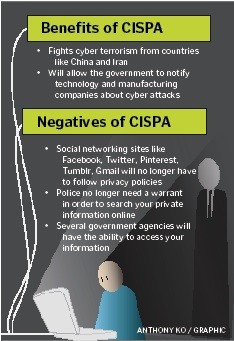Despite being defeated for two consecutive years in Congress, the Cyber Intelligence Sharing and Protection Act (CISPA) passed in the U.S. House on another attempt on April 18 by a 288 to 127 vote. The bill currently presents a heavy issue of debate among Internet activists and politicians alike. Among those debates, the concern of privacy recurs as the prominent topic of discussion.
 Since its first appearance in November 2011, CISPA’s main statement has been to grant government access to individuals’ online private information upon suspicion of a cybersecurity threat without a warrant. Although its central purpose is to strengthen the security of networks against possible cyber attacks, opponents argue against the bill’s ambiguously defined limits and vaguely worded statements such as what constitutes “cyber threat intelligence.” Proponents, on the other hand, argue that the information companies would share because of the bill would be on a voluntary basis and that recent revisions have refined previous ambiguities.
Since its first appearance in November 2011, CISPA’s main statement has been to grant government access to individuals’ online private information upon suspicion of a cybersecurity threat without a warrant. Although its central purpose is to strengthen the security of networks against possible cyber attacks, opponents argue against the bill’s ambiguously defined limits and vaguely worded statements such as what constitutes “cyber threat intelligence.” Proponents, on the other hand, argue that the information companies would share because of the bill would be on a voluntary basis and that recent revisions have refined previous ambiguities.
“(CISPA) will help to keep the lives of the American people more secure nowadays,” Ari Brown, supporter of CISPA and sophomore, said. “Government intelligence will be able to tap into more resources to broaden the search and crack down on cyber attacks… (it’ll) stop the bad guy before the crime is committed.”
In contrast to Brown’s view, Krishna Pathak, president of CHS Politics Club and sophomore, said he believes the bill will give the government too much power and may be abusive and overbearing.
“High school students should realize that everything they post can potentially be forwarded to the federal government and future employers, regardless of their privacy settings,” Pathak said via email. “In my opinion, CISPA is more of an alternative to have surveillance on us than it does to protect us.”
Unlike the notorious Stop Online Piracy Act (SOPA) and Protect IP Act (PIPA) that incited much of the public’s disapproval, CISPA, according to U.S. News and World Report, has the support of many Internet companies, including Facebook, who not so long ago protested SOPA.
However, history teacher John Hebert said that regardless of the situation, the bill is currently dying with both the Senate and president publicly expressing their objections.
“I know President Obama has threatened to veto (the bill) more than once even with the revisions,” Hebert said.
According to Senator Jay Rockefeller’s public announcement, CISPA currently remains stalled in the Senate with a 52 to 46 vote, as contenders consider writing their own legislation instead of voting on CISPA.
Pathak said he hopes these obstacles in the Senate and executive branch will prevent this bill from passing.
“It’s a direct violation of privacy,” Pathak said. “It amends the National Security Act of 1947 to easily let the federal government swap information about you, your family and your friends if they believe it’s essential to ‘national security.’ This isn’t through warrant or anything; if they want it, they get it.”




























![Keep the New Gloves: Fighter Safety Is Non-Negotiable [opinion]](https://hilite.org/wp-content/uploads/2024/12/ufcglovescolumncover-1200x471.png)
















































![Review: “We Live in Time” leaves you wanting more [MUSE]](https://hilite.org/wp-content/uploads/2024/12/IMG_6358.jpg)
![Review: The premise of "Culinary Class Wars" is refreshingly unique and deserving of more attention [MUSE]](https://hilite.org/wp-content/uploads/2024/12/MUSE-class-wars-cover-2.png)
![Introducing: "The Muses Who Stole Christmas," a collection of reviews for you to follow through winter [MUSE]](https://hilite.org/wp-content/uploads/2024/12/winter-muse-4.gif)
![Review: "Meet Me Next Christmas" is a cheesy and predictable watch, but it was worth every minute [MUSE]](https://hilite.org/wp-content/uploads/2024/11/AAAAQVfRG2gwEuLhXTGm3856HuX2MTNs31Ok7fGgIVCoZbyeugVs1F4DZs-DgP0XadTDrnXHlbQo4DerjRXand9H1JKPM06cENmLl2RsINud2DMqIHzpXFS2n4zOkL3dr5m5i0nIVb3Cu3ataT_W2zGeDAJNd_E-1200x884.jpg)
![Review: "Gilmore Girls", the perfect fall show [MUSE]](https://hilite.org/wp-content/uploads/2024/11/gilmore-girls.png)
![Review in Print: Maripaz Villar brings a delightfully unique style to the world of WEBTOON [MUSE]](https://hilite.org/wp-content/uploads/2023/12/maripazcover-1200x960.jpg)
![Review: “The Sword of Kaigen” is a masterpiece [MUSE]](https://hilite.org/wp-content/uploads/2023/11/Screenshot-2023-11-26-201051.png)
![Review: Gateron Oil Kings, great linear switches, okay price [MUSE]](https://hilite.org/wp-content/uploads/2023/11/Screenshot-2023-11-26-200553.png)
![Review: “A Haunting in Venice” is a significant improvement from other Agatha Christie adaptations [MUSE]](https://hilite.org/wp-content/uploads/2023/11/e7ee2938a6d422669771bce6d8088521.jpg)
![Review: A Thanksgiving story from elementary school, still just as interesting [MUSE]](https://hilite.org/wp-content/uploads/2023/11/Screenshot-2023-11-26-195514-987x1200.png)
![Review: "When I Fly Towards You", cute, uplifting youth drama [MUSE]](https://hilite.org/wp-content/uploads/2023/09/When-I-Fly-Towards-You-Chinese-drama.png)
![Postcards from Muse: Hawaii Travel Diary [MUSE]](https://hilite.org/wp-content/uploads/2023/09/My-project-1-1200x1200.jpg)
![Review: "Ladybug & Cat Noir: The Movie," departure from original show [MUSE]](https://hilite.org/wp-content/uploads/2023/09/Ladybug__Cat_Noir_-_The_Movie_poster.jpg)
![Review in Print: "Hidden Love" is the cute, uplifting drama everyone needs [MUSE]](https://hilite.org/wp-content/uploads/2023/09/hiddenlovecover-e1693597208225-1030x1200.png)
![Review in Print: "Heartstopper" is the heartwarming queer romance we all need [MUSE]](https://hilite.org/wp-content/uploads/2023/08/museheartstoppercover-1200x654.png)




